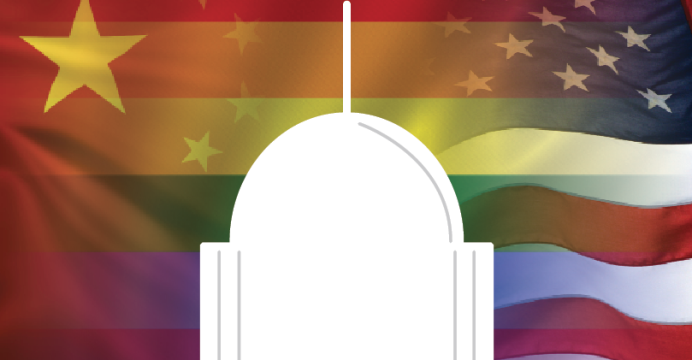By Zhao Li, The Daily Iowan

One student is coming to terms with his sexuality halfway across the world.
“In my hometown, there are some gay people I know. They never told others they are gays. They do not want to show their sexualities to others, so they pretend to be straight,” said University of Iowa student Shanyi Shang.
Shang, a third-year finance student, originally came from Bengbu, a smaller city in Anhui, an inland province of China. He knew he was into the same sex when he was very young.
“It was in my elementary school,” Shang said with a shy smile. “I had a crush on my physical education class teacher. He was so handsome. I did not have a strong concept of homosexuality at that time, but I knew I was totally into him.”
According to Shang, it is hard for homosexual people to show their real sexuality if they are coming from small cities in China.
“In my hometown, people do not accept homosexuality, and they kind of discriminate homosexual people,” Shang said. “Gay people are afraid to tell others about their real sexuality, so they pretend to be straight. It’s hard.”
China decriminalized homosexuality in 1997 and removed it from the list of mental disorders four years later. According to OutRight Action International, an international human rights commission for the LGBT community, the Chinese government has since been largely silent on the issue. Gay marriage is still not legal in the country.
According to the organization, there is no sexual education for LGBT students for Chinese students. There are no anti-discrimination laws for the community. A survey by the Aibai Culture and Education Center in 2012 also found that 77 percent of respondents were bullied based on sexual orientation or gender identity.
Shang said he is “half-come out,” by which he means he has never told his parents his real sexuality. However, his cousins and friends know.
“Because we are a young generation, we can understand [homosexuality],” Shang said. “However, my parents do not have any concept about gay people. I do not want to freak them out, especially I am now studying abroad in another country [and being so far away from my family].”
Chanelle Thomas, manager of the UI LGBTQ Resource Center, said she understands Shang’s feeling’s since homosexuality is not commonly accepted in some cultures.
“I know there are some countries where homosexuality may be punished by death,” Thomas said. “Even some places here in the United States, if people see two guys holding hands [walking] on a street, they will probably use some hate speech.”
Chloe Cable, the LGBTQ constituency senator of UI Student Government, said the LGBTQ organization on campus hosts events with UISG, and the members try their best to make sure LGBTQ students feel involved — international or not.
“We have not had any LGBT events targeted at international students, but we do invite everyone to our events,” Cable said. “We make sure they [LGBTQ students] feel comfortable if they do show up. And we also do have the International Student Advisory Board, which is not LGBTQ focused, but is still working on some of these gaps.”
Shang felt very grateful for all of his friends, both in the United States and China, for being so supportive.
“I am so lucky I’ve never being discriminated by my friends because I am a gay, and I have a lot of straight friends here in the U.S, too.” Shang said. “I think they treat gay people just like normal people, with no discrimination.”
Shang emphasized his wish to be treated like anyone else.
“I just want to be normal. I am also like one of those straight guys.” Shang said. “If you treat me like a normal [person], that’s enough [for me].”
Watch a video interview with Shang here.